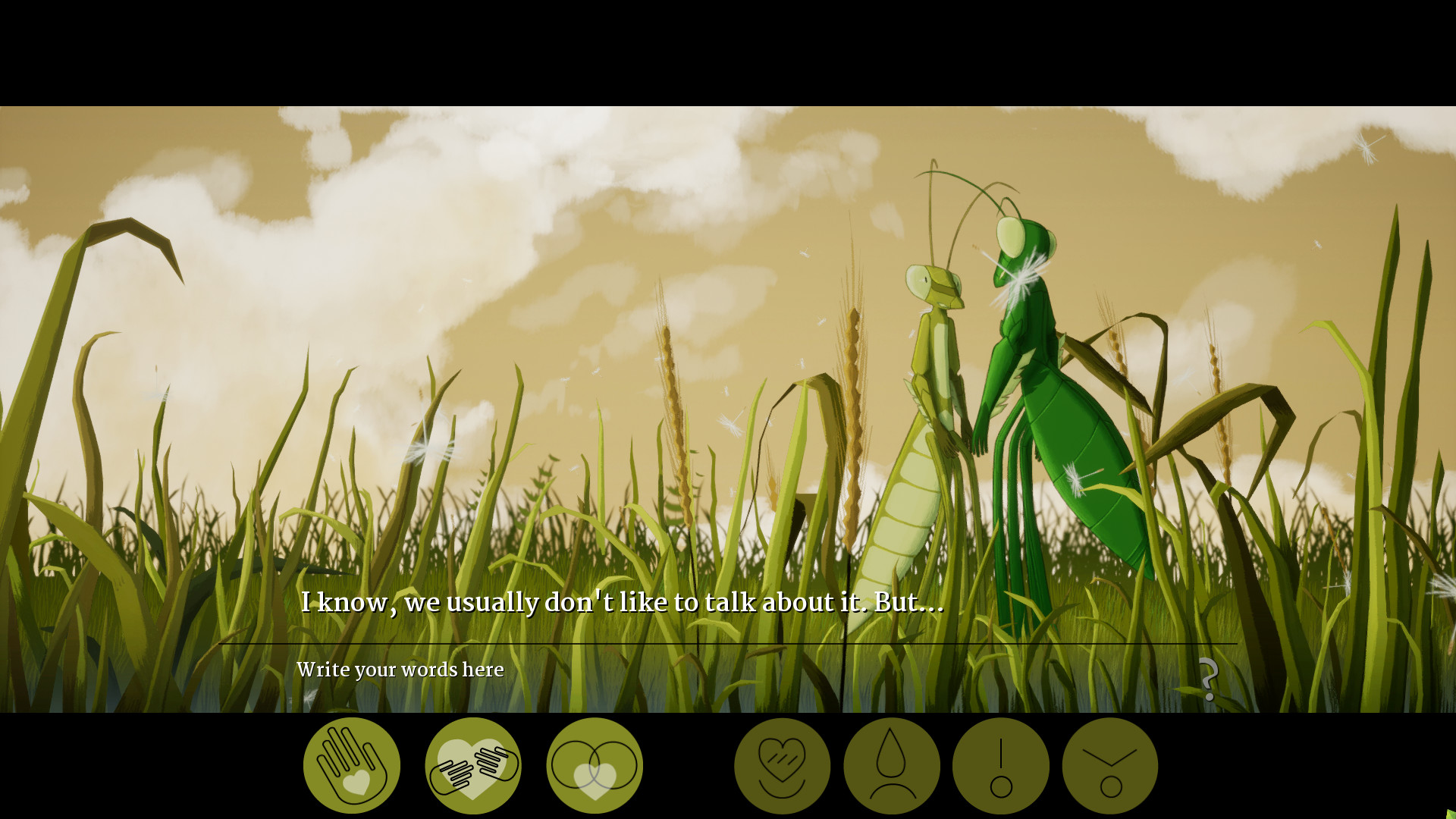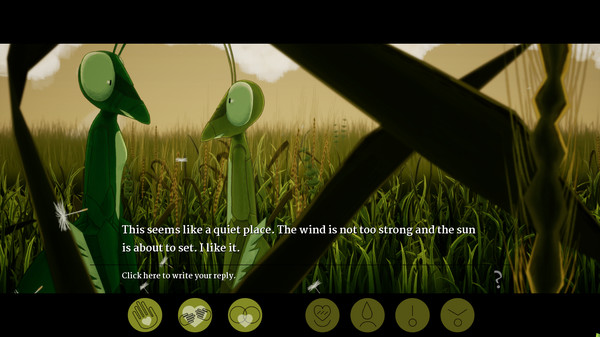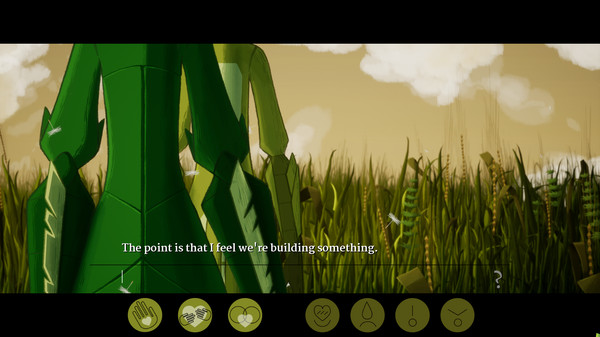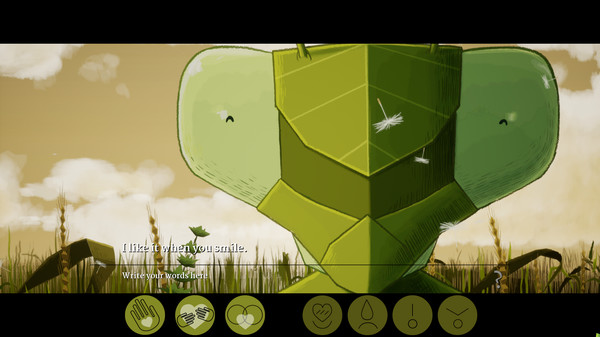Maggese Games‘s Don’t Make Love has been nominated for Best Student Game at this year’s IGF awards. Artist Nina Kiel was kind enough to chat with Cliqist about inspiration, romance mechanics, and the essence of the tragedy at Don’t Make Love’s core.

Blossoming Romance
Cliqist: Hi Nina. Thanks for taking the time to chat. Easy one first, what are you playing at the moment?
Nina Kiel: After spending the greater part of 2017 with Breath of the Wild, I decided to finally play some shorter games that fell by the wayside. Having just finished Inside, I’m currently playing Doki Doki Literature Club and planning to have a look at Far From Noise, soon. That being said, I also started playing Persona 5 with my partner a couple of days ago, so I guess my plan to put more complex games aside for a while has officially failed.
Generally speaking, the inner lives of Praying Mantises have been sorely underrepresented in games. Where did the initial idea for Don’t Make Love come from?
Before going into details, I’d like to point out that the idea was introduced by my fellow developer and friend Dario. He developed the concept for his application at the Cologne Game Lab, where we both started studying in 2015. During our first semester, he decided to turn the concept into a game and asked me to work on the visuals. A little later, we were joined by his friend Giorgio, the second founding member of Maggese, who became responsible for the game’s audio design.

As for the idea itself, it’s basically the result of two major observations: While many games offer the opportunity to court NPCs and date them, explorations of relationship dynamics are quite rare. In fact, most stories simply end once the lovers are newly united, so as the player, you never get to know if they actually make a good couple and how they impact each other’s lives. Besides that, Dario was also fascinated by the mating rituals of praying mantises and wondered how they would behave if they had a consciousness and feelings similar to humans… so he decided to make a game about the troubled relationship of two praying mantises and we ended up developing Don’t Make Love together.
A Labour of Love
What really stood out to me was how differently Don’t Make Love approaches romantic conversation. Seduction is so often reduced to a minigame, to winning and losing – literally, ‘scoring’, to use game language. In what ways do you think Don’t Make Love challenges the depictions of intimacy we’ve grown used to in gaming?
Games tend to oversimplify not only the process of seduction, but romance and (sexual) relationships in general. There are some exceptions, of course – like Christine Love’s Ladykiller in a Bind and Kinmoku’s One Night Stand, to name only two – but generally speaking, games are just not interested in the long-term impact love has on people’s lives. As you pointed our yourself, the main reason for this is probably that courtship and seduction seem to have clear win-states: If you “get” your love interest, you win, and if they reject you due to incorrect dialogue or quest choices you made earlier in the game, you lose. What would be the win-state of a relationship, though? To die together after a long and happy life? It’s certainly a nice thought, but rather difficult to translate into game mechanics.

Don’t Make Love challenges the status quo of playable relationships by skipping the exciting process of courting and throwing the players into an existing relationship that faces major difficulties, the main one being the fear of death, as the female mantis might devour the male during sex. So not only do the players have to navigate through a troubled relationship instead of being rewarded with a flawless partner and the promise to live happily ever after, they are also given the opportunity to avoid having sex. This is extremely unusual, since sexual encounters are usually the trophies you get for being nice and attentive (i.e. basically agreeing to everything the love interest says and fulfilling their every wish). In Don’t Make Love, there are no trophies and there’s no clear win-state. If the two mantises decide to have sex in the end, there’s a chance that the male actually dies. We decided to keep the game open-ended, though, because it’s all about the process, not the result. It basically focuses on two lovers establishing consent and making decisions for the future, without knowing what awaits them.
Courting the Muse
Any inspirations as an artist? Did you take other elements like music or mechanics into consideration when considering the overall look of the game?
When it comes to sources of inspiration, I have a selection of go-to books and blogs I enjoy browsing at the beginning of a creative process, but it’s less about finding styles to adapt and modify and more about kickstarting my creativity. Since I don’t do much illustration work at the moment, it’s sometimes difficult for me to get in the mood and start drawing; looking at the work of artists I admire helps a lot with that.
As for the art style of Don’t Make Love, I was trying to match the tone of the game and always had our target audience in mind, but apart from that I just experimented a bit and went for a style that me and the rest of the team found visually appealing. Unfortunately, the soundtrack was not available at this point – Giorgio started composing the music after we decided for a visual style – so his work did not influence my mine, but I think both parts work together really nicely now.

Don’t Make Love opens with a quote from Friedrich Schelling. What can you tell our readers about the choice of quote, and how you feel it relates to the game?
Dario started reading A Lover’s Discourse: Fragments by Roland Barthes, after someone recommended it to him when he showcased the prototype of Don’t Make Love for the very first time. He told me that it inspired a large share of the in-game dialogues and the quote by Friedrich Schelling from that book just seemed to reflect the game’s scenario very well. I actually had to ask him about the meaning of the quote myself when he decided to put it into the game and this is the gist of what he told me: On one hand, the two mantises want to express their mutual love, but on the other hand, they’re facing the necessity of holding themselves back. In this and every other relationship, there is no clear answer, no right choice, and as Schelling puts it, the “indifferentation” between the two opposites is basically the essence of tragedy.
Thanks to Nina Kiel for taking the time to speak with us. If you’d like to check out Don’t Make Love head over to its Steam page. You can read the rest of our IGF 2018 coverage right here.



